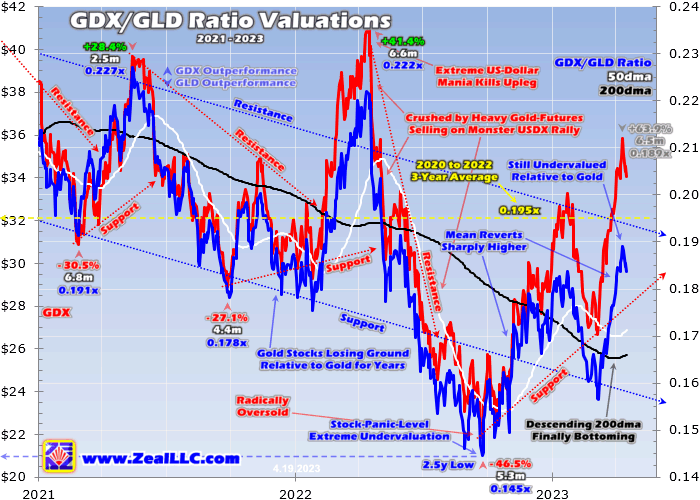Gold Stocks Still Undervalued
By Adam Hamilton
The gold miners’ stocks continue powering higher on balance, growing their strong upleg. Yet despite their great gains over this past half-year, gold stocks still remain undervalued relative to their metal. Mean reverting sharply higher out of last year’s anomalous extreme selloff, this battered sector still hasn’t even regained recent years’ average valuations. That implies this mounting upleg still has lots of room to run.
The gold standard for stock valuations has always been traditional trailing-twelve-month price-to-earnings ratios. Any company’s stock price is simply divided by the sum of its last four reported quarters of bottom-line earnings per share. Reported to national securities regulators, these actual recent hard accounting profits minimize estimates. They are way superior to forward P/Es, which are based on guesses of future EPS.
After every quarterly earnings season, I analyze the latest results reported by the 25 largest component companies of the leading GDX gold-stock ETF. Among much other data, we gather TTM P/Es for these major gold miners. But unfortunately those are regularly distorted by large one-time non-cash expenses that are flushed through income statements. This industry’s biggest one is mine-impairment charges.
As companies build and buy mines, their costs are capitalized as assets on balance sheets. But when key assumptions for mine forecasts change adversely, companies are required to write down assets to lower fair values. Mine impairments can result from lower-than-expected ore grades, higher-than-expected mining costs, metallurgy difficulties, geological challenges, geopolitical threats, and even higher interest rates.
While individual major gold miners don’t suffer valuation-skewing non-cash impairment charges often, the GDX-top-25 companies collectively are usually reporting some. That makes traditional valuation analysis on this sector difficult. Just in the latest-reported Q4’22, the world’s two biggest gold miners dominating GDX near 1/5th of its total weighting both had huge mine-impairment charges torpedoing their P/E ratios.
Newmont’s terrible $1,477m Q4 loss resulted from $1,317m of impairments across three mines as well as a $620m reclamation charge. Without these unusual items alone, it would’ve earned a $460m profit! Barrick Gold had its own $950m impairment charge on three of its own mines, which was partially offset by a much-rarer $120m impairment reversal on another. That left it with an ugly $735m accounting loss.
TTM P/E analysis won’t work with losses driven by big non-cash charges. They can be reversed out, but that’s labor-intensive and potentially subjective. Sometimes gold miners don’t publish sufficient detail on unusual income-statement items to make them clear, complicating analysis. Thankfully gold stocks have a great valuation proxy unique to this sector, the ratio of their collective stock prices to prevailing gold levels.
That GDX VanEck Gold Miners ETF is the most widely-followed measure of major-gold-stock prices. It pairs nicely with the mighty American GLD SPDR Gold Shares gold ETF, which is the world’s largest by far. Dividing the former’s price by the latter’s yields the GDX/GLD ratio or GGR. When charted over time, this construct reveals when gold stocks are undervalued or overvalued relative to the metal they mine.
The GGR works because gold-mining profits directly mirror and amplify underlying gold trends, and stock prices ultimately follow profits. A gold miner with $1,225 all-in sustaining costs earns $375 per ounce at $1,600 gold. But if gold rallies 25% to $2,000, those profits more than double soaring 107% to $775 since AISCs don’t change much. These numbers reflect major gold miners’ actual experience over the past six months.
This chart superimposes the GDX/GLD ratio and some of its key technicals over the raw GDX during the last couple years or so. At this gold-stock upleg’s latest high-water mark in mid-April, the GGR climbed to 0.189x. In other words, a share of GDX was worth 18.9% of a share of GLD. Interestingly even that remained below the three-year GGR average of 0.195x from 2020 to 2022! Gold stocks are still undervalued.

How is that possible with GDX just blasting 63.9% higher at best over 6.5 months? Shouldn’t gold stocks collectively be back in overvalued territory relative to their metal? Normally they’d be getting there, but last year this sector plummeted in an exceedingly-anomalous extreme selloff. In just 5.3 months into late September, GDX cratered a gut-wrenching 46.5%! That crushed the GGR way down to an absurd 0.145x.
That left gold stocks the most undervalued they’d been relative to gold since in the dark heart of March 2020’s brutal pandemic-lockdown stock panic! Amazingly even during that, the GGR only closed lower on two trading days. So last autumn’s left-for-dead gold-stock prices were wildly unsustainable. I warned about that one trading day before GDX and the GGR bottomed in an essay on that false gold-stock panic.
That epic valuation disconnect was fueled by the Fed’s most-extreme tightening cycle ever, a blistering series of monster rate hikes off zero accompanied by money-supply-shrinking bond selling. That savage hawkishness catapulted the US dollar stratospheric to extreme multi-decade secular highs, unleashing massive gold-futures selling hammering the yellow metal lower. The gold-stock carnage was collateral damage.
With gold stocks unrighteously both extremely undervalued and extremely oversold from late September to early November, we aggressively bought crazy-low to fill our newsletter trading books. Our unrealized gains since on individual mid-tier and junior gold-stock trades have soared as high as +123.6% this week! Always staying informed on the markets pays out big, enabling smart contrarian trading to buy in really low.
GDX was born in May 2006, becoming the first popular gold-stock ETF. During its entire long 16.9-year lifespan since, there have only been two other episodes where it had been as undervalued relative to gold as last autumn. The worst was a stretch between July 2015 to February 2016 when the last secular gold bear bottomed then reversed into a new secular bull. The GGR languished under 0.145x for 134 trading days.
Such extreme gold-stock undervaluations weren’t seen again until that March 2020 pandemic-lockdown stock panic. Again the GGR only fell under 0.145x on two trading days. Later that crazy-anomalous late-September-2022 low was the third sub-0.145x ever, on one single trading day. So gold stocks trading so low relative to gold is exceedingly rare. Extreme prices are driven by extreme sentiment which is never sustainable.
So soon after excessive herd fear bludgeons gold-stock prices to anomalous lows compared to prevailing gold prices, they start mean reverting sharply higher. Everyone susceptible to being scared into selling low has sold, leaving only buyers chasing accelerating upside momentum. This mean-reversion dynamic is the entire story behind today’s gold-stock upleg so far. And very bullishly it likely remains far from over.
Mean reversions after anomalous price extremes almost never run out of steam at preceding averages. They usually overshoot proportionally nearing the opposite extreme before giving up their ghosts! Think of a pendulum. After pulling it up as high as possible then releasing, it doesn’t merely stop at the bottom of its arc. Instead the swing back gathers so much momentum that it blasts right through to the opposing top.
So the GGR almost certainly isn’t just heading back to its preceding-three-year average running 0.195x. Incidentally even that is on the low side, dragged down by March 2020’s stock panic and last year’s crazy selloff anomaly. Odds are the GGR will overshoot somewhat proportionally towards the opposite extreme before this upleg fails. That 0.195x mean less that 0.145x stock-panic-grade low gives 0.050x of upside play.
Add that back onto the average for a proportional overshoot, and that yields a GDX/GLD ratio upside target of 0.245x. That’s not aggressive at all. The GGR has actually closed above 0.245x in over 40% of all the trading days in GDX’s entire history! While that was mostly in this ETF’s earlier years, in early July 2020 major gold stocks’ huge post-stock-panic mean-reversion upleg peaked at a similar GGR of 0.241x.
GDX skyrocketed 134.1% higher before that monster upleg petered out! And erupting out of gold stocks slammed to stock-panic lows, that mighty upleg is certainly the most similar one to today’s in recent years. Even 2021’s and 2022’s much-smaller gold-stock uplegs prematurely truncated by extreme Fed hawkishness spawning heavy gold-futures selling both crested at higher GGRs running 0.227x and 0.222x.
So regaining 0.240x in a mean-reversion-overshoot upleg after collapsing to 0.145x isn’t unreasonable at all. I suspect those gold-stock valuations are way too conservative. As gold-stock uplegs grow massive, they increasingly attract growing legions of traders rushing in to chase the strong upside momentum. The resulting soaring herd greed bids up gold-stock prices way faster than gold’s, leaving them really overvalued.
With today’s GDX upleg already up 64% as of last week, it has much more in common with early 2020’s 134% beast than the last couple years’ artificially-lopped 28% and 41% ones. If GLD prices merely stayed at mid-week levels, a 0.24x GGR implies a GDX upside target near $44.50. That would give room for the major gold stocks to power up another 31% from here, extending GDX’s total upleg to 103% gains!
I’m always thrilled with a doubling, which has happened in many gold-stock uplegs over the past couple decades. That’s why contrarians put up with this sector’s outsized volatility, because gold-stock upleg-correction cycles yield so many great opportunities to rapidly multiply wealth! I’m not aware of any other stock-market sectors that rival gold stocks’ price swings, in terms of both their magnitude and frequency.
But gold stocks are only likely to keep powering higher on balance if their underlying metal does. They are ultimately just leveraged plays on gold. At best as of mid-week, GLD’s own driving upleg had grown to 25.5% since late September. A month ago in an essay on gold’s upleg rocketing back, I explained why gold’s gains could easily exceed 40% this time around. One reason is its own mean-reversion overshoot.
Like GDX, gold was also pounded to an extreme stock-panic-grade 2.5-year low late last September! Its mighty upleg after the last time it was that low during March 2020’s stock panic ballooned to 40.0%. And the preceding upleg that panic interrupted crested up 42.7%. So a 40% upleg today given this far-more-bullish backdrop with inflation raging out of control isn’t a stretch. That would push GLD shares up near $212.
Apply that 0.24x GGR-overshoot target to that, and this GDX upleg has real potential to power way up around $51 before yielding to the inevitable correction. That would extend this total upleg to 132% gains since late September, right in line with mid-2020’s post-stock-panic 134% ones! These exact numbers aren’t important, just illustrations. The key takeaway is still-undervalued gold stocks have lots of upside left.
And that’s just in GDX terms, which is dominated by major gold miners. Saddled with the inertia of their huge annual production levels and massive market capitalizations, they only tend to leverage material gold moves by 2x to 3x. The smaller fundamentally-superior mid-tier and junior gold miners what we’ve specialized in at Zeal for decades now tend to way outperform the majors. They should keep soaring on balance.
Obviously the ideal time to back up the truck and buy gold stocks was between late September to early November last year when they were exceedingly undervalued. That’s what we did in our newsletters, leaving our subscribers with huge-and-growing unrealized gains today. Buying in much higher now is riskier, even in a strong upleg. But other factors besides gold-stock valuations argue for more rallying.
The most-important one is speculators’ positioning in gold futures, so I analyze that weekly data in every newsletter. The latest read showed gold had plenty of room to run yet, with less than half of specs’ likely gold-futures long buying finished. While they continue adding longs, gold will keep climbing on balance. And sooner or later gold will have rallied high enough for long enough to start attracting back far-bigger investment.
Another key thing to consider for deploying capital mid-upleg is how overbought gold and gold stocks are. In last week’s essay I analyzed that for GDX, showing that this gold-stock upleg is immature. As long as this sector hasn’t blasted up to upleg-slaying levels of overboughtness, and as long as valuations relative to gold aren’t high, an in-progress gold-stock upleg likely has staying power. That’s certainly the case now.
Traders love chasing upside momentum, which mounts as greed grows later in major uplegs. And the gold miners are also likely to report fat profits in their imminent Q1’23 earnings season. Last quarter’s average gold price surged 9.3% sequentially from Q4 to $1,892! And the gold miners mostly forecast improving output lowering all-in sustaining costs. So earnings are poised to blast higher, fueling more buying.
The bottom line is gold stocks are still undervalued, despite their mounting upleg over this past half-year or so. Gold-stock prices remain low relative to prevailing gold levels, still under the preceding few years’ average. And after being crushed to stock-panic-grade extreme undervaluations last autumn, the gold stocks’ strong mean-reversion upleg underway is highly likely to proportionally overshoot before failing.
All that argues this latest gold-stock upleg still has lots of upside potential in coming months. While how much depends on gold’s fortunes, gold-stock gains could still almost double from here. That would finally drive sector pricing back up to overvalued levels, heralding this upleg’s swan song. So while not as ideal as buying in super-low a half-year ago, there are still plenty of opportunities to ride more gold-stock upside.
Adam Hamilton, CPA
Legal Notice / Disclaimer
Ahead of the Herd newsletter, aheadoftheherd.com, hereafter known as AOTH.Please read the entire Disclaimer carefully before you use this website or read the newsletter. If you do not agree to all the AOTH/Richard Mills Disclaimer, do not access/read this website/newsletter/article, or any of its pages. By reading/using this AOTH/Richard Mills website/newsletter/article, and whether you actually read this Disclaimer, you are deemed to have accepted it.




























